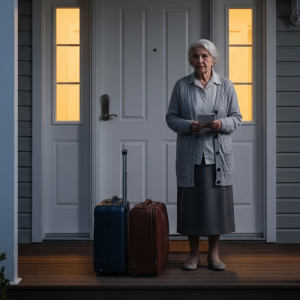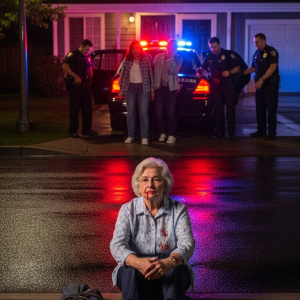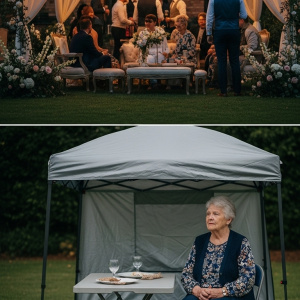My brother’s son, Chase, got drunk at a family gathering and announced to everyone that I was just the “sad aunt who buys love.” The room filled with laughter, even from his mother. I didn’t say a word; I just left. A few days later, I did something that made their phones light up with panicked messages.
I wanted to flip the entire table. Every insult, every snicker, every shared glance that passed between them like a private joke—I felt each one like a physical slap. And yet, I didn’t shout. I didn’t cry. I didn’t storm out like some tragic character in a cheap drama.
I just stood there, silent, while my nephew called me the sad aunt who buys love. This was the same kid whose rent, tuition, and groceries I had been quietly paying for. They all laughed. My brother, his wife, even my own mother, who tried to hide her smile behind her hand as if that would soften the blow.
No one looked shocked, just amused, as if a long-held secret was finally spoken aloud. I left before I did something I would regret. But as I drove home, a single thought coiled in my mind like smoke: Don’t bite the hand that feeds you.
I could have cut them off right then and there, but I didn’t want revenge that burned fast and bright. I wanted it to unfold slowly, beautifully, like a lesson taught with care. The boy wanted to humiliate me in front of everyone? Fine. It was time he learned who held the leash he’d been chewing on.
What none of them seemed to remember was that Chase’s shiny apartment two states away—the one near campus with central air and a fitness center—was in my name. He couldn’t legally rent it without me. I had found it, paid the security deposit, and arranged everything. His parents hadn’t lifted a finger.
That night, while they were probably still passing around leftover ribs and giggling about Aunt Stella, I was on the phone with the landlord. “I understand this is unconventional,” I said calmly, “but I need to terminate the lease. I’m prepared to cover the next month’s rent and any relisting fees to expedite the process.” He was polite, confused, but ultimately cooperative.
By morning, the paperwork was digitally signed. Chase would be getting a notice via email and a firm knock on his door. When I woke up the next day, I had 22 unread messages. The first was from my brother, Nate: What did you do? The second, from Chase: Are you kidding me right now?! The third was a missed call from my mother. I didn’t reply to any of them. That’s when the real panic began.
Chase didn’t even read the email. His roommate, Trent, told me later that Chase had been gaming all night. He woke up around noon and found the eviction notice taped to his door like a bad prank. He thought it was a mistake, then a joke. Then, he started screaming.
Meanwhile, I was at home in silk pajamas, pouring oat milk into my coffee and scrolling through luxury property listings. I wasn’t planning to buy anything; I just liked the quiet reassurance of knowing I could. The phone started buzzing before noon. At first, I let the calls stack up, just to watch the number climb.
My brother, Nate, went straight to fury, texting me four times in a row. “You need to fix this. NOW. This isn’t funny. He has nowhere to live because of you.” I could almost hear his voice—that spoiled, demanding bark he’d used since we were kids, whenever someone dared to tell him no.
His wife, Kayla, tried a softer approach. She was always the cleaner, the one who came in after Nate’s messes and tried to mop them up with a veneer of understanding. “Stella, sweetie, let’s not escalate things. Can we just talk this out, like family?” Family. That word had started to feel like a trap.
What none of them understood was that I hadn’t snapped. I had simply paused. I had finally seen them all with perfect clarity, and I had quietly picked up the scissors.
That afternoon, my phone filled with messages that were just different shades of the same color: accusation disguised as concern, and concern disguised as moral superiority. Nobody asked me how it felt to be ridiculed by the very people I was keeping afloat.
Then came the group chat notification: FamilyOnly. I hadn’t seen it light up since they kicked me out of it last January for not attending my dad’s birthday party. Suddenly, I was welcome again.
My mom was the first one in. “Stella, please. You’ve made your point. Can we all just calm down now?”
Then my dad. “This isn’t how our family handles things. Chase is young, he made a mistake. Family doesn’t turn on each other over a silly joke.”
And Kayla, of course: “You’re better than this, Stella. We all know you are.”
Nobody mentioned the insult. Nobody admitted that what Chase said was wrong. It was all about my reaction. I went to dinner that night alone, at my favorite little Japanese place where they remember my name and always bring me a complimentary mochi. I turned my phone face down and let it buzz until the battery died.
When I finally checked my phone again, Nate had sent one last message. “So this is all about your sad little ego and your ugly crooked nose? I thought you’d outgrown the middle school drama. Guess not.”
That’s when I stopped feeling amused.
The next morning, I called my accountant. “Let’s make a few adjustments,” I said. I cut the tuition payments. I froze the credit card I’d given Nate two years ago when he “just needed help for a few months.” I canceled the rent support for my parents’ condo. All the lifelines—cut quietly, quickly, and with surgical precision. They didn’t know it yet, but they were about to find out what happens when the provider walks away.
It started around 8:00 a.m. the next morning. Missed calls from Nate, my mom, my dad, all followed by voicemails I didn’t listen to. By noon, they realized what had happened. Nate’s credit card was declined at the gas station. My parents’ monthly rent deposit never arrived.
That’s when the real calls started. My mom left six voicemails, her tone shifting from confusion to panic. My dad called from his office line, something he hadn’t done in years. Nate didn’t waste time with pleasantries.
“You’re punishing EVERYONE because your feelings got hurt. Grow up. You think you’re untouchable because you make money now? You forget who was there for you when you were a nobody. This is cruel and pathetic. You’re not a queen, you’re just bitter and alone.”
Bitter and alone. It’s funny how when you give, it’s gratitude at first, then entitlement, then silence. The moment you stop, you’re suddenly the villain. I wasn’t being cruel. I was being clear.
The best part was when Chase himself finally texted me, a little white flag shoved through the fog of their anger. “I’m sorry, okay? I was drunk. It was just a joke. Can we PLEASE fix this?” I stared at the message for a long moment. Then I blocked his number.
By the end of the week, Kayla sent me a long, rambling message on social media from a new account, since I’d blocked her too. It was a two-page essay on how I was destroying the family, how they were just joking around because they thought we were close. But it wasn’t just one night. It was years. And they all knew it.
That weekend, my parents staged what I can only describe as a trap. My mom asked me to meet them at a new brunch place. “Just the three of us,” she wrote. “No drama.” I showed up out of morbid curiosity. And there they were, sitting at a table, already sipping coffee: Nate, Kayla, and Chase. I turned around and walked out before a single word was spoken.
It took them three more days to realize I wasn’t coming back.
Two days after the failed brunch ambush, Nate showed up at my home. I’d never invited him to my condo, but I guess my parents gave him the address, thinking I’d be too polite to slam the door in his face. He rang the bell, then knocked, then waited.
I watched him on my security app, standing there in a hoodie and old jeans, pacing and pulling out his phone. He stood outside for over ten minutes before finally yelling toward the door like we were in a sitcom. “So this is it?! You think you’re better than us now? That your money makes you untouchable?”
I didn’t move. I didn’t answer. He finally gave up and walked off, flipping off the doorbell camera on his way out like a petulant teenager. It was so childish, I actually laughed.
The next day, a handwritten letter from my mother arrived. It was full of talk about forgiveness and family bonds, and how I was taking things too far. Then came the line that revealed everything: “You’ve always been the one who holds us together, especially now when things are tough.”
That was it. They weren’t sorry for what they did. They were scared of losing their safety net. I sat down and wrote a reply—one single paragraph.
“You don’t get to mock me and live off of my support at the same time. I am not your ATM, your therapist, or your fool. I’m done.” I mailed it, and that was that.
I thought it would go quiet after that, but cutting them off didn’t make them vanish. It made them unravel publicly. A coworker stopped me in the hallway. “Hey, I didn’t know your nephew dropped out of school.” That was news to me.
A cousin tagged me in a social media comment under a photo of Chase bussing tables in a fast-food uniform. “Didn’t he have that nice place downtown? What happened?” They were rewriting the story, but they couldn’t keep it straight.
Then, a text from an unknown number: “Hi Stella, this is Mrs. Ferris, Chase’s academic adviser. I was told you might be able to assist with some paperwork related to his housing.” I didn’t reply. He wanted to be a grown-up; let him learn how leases and withdrawal forms work.
The real surprise came two days later. A large box was on my doorstep. Inside were every single birthday card, letter, and holiday note I’d ever sent Chase. At the bottom was a photo of us from when he was eight, laughing on a day I took him to the lake because his parents were too busy. No note. Just quiet contempt wrapped in cardboard.
I stood there for a long time. Then I sealed the box again and wrote one word across the top with a black marker: DONATED. I dropped it at a local shelter the next morning. And that evening, I booked a solo trip, first class, to somewhere warm and distant where no one knew my name.
The trip was supposed to be a reset. For three days, I woke up to nothing but the sound of the ocean and the kind of silence that doesn’t ache. Then, an email, forwarded by my assistant: the financial office from Chase’s college had contacted my company, assuming I was still his sponsor and requesting reinstatement.
I walked the beach for an hour until my anger subsided. Then I sent the cleanest email I’ve ever written: “I am no longer involved in Chase Ellison’s financial matters. Please remove my contact information from all future correspondence.” I copied their legal department.
Two days later, my father phoned my office, pretending to be an investor to get my return date, claiming it was a “private family matter.” That was the moment it crystallized. This was never about love. It was about access. I wasn’t a person to them; I was a resource that had run dry.
When I finally landed back home, I started cleaning house digitally—blocking numbers, deleting old chats, scrubbing every last trace of them from my life. Then, a package arrived. It was an old photo album, one I had made for Chase when he was ten. Tucked inside was a folded note from my aunt Lauren.
“I told them not to send this,” it read. “I told them you’d see through it. But I also knew you’d open it. I’m not like them. Let me know if you ever want to talk. Not for them. Just for us.”
Later that night, a new group chat popped up on my phone: Just the Sisters. Lauren had added me. No message, no pressure. Just quiet space. I didn’t reply, but I didn’t leave either.
Two quiet months passed. Then, one Friday evening, I saw someone standing across the street from my building, under a streetlamp in the pouring rain. It was Chase. He looked thinner, the arrogance washed from his face.
I walked out to meet him. He started to speak, but I held up a hand. “Don’t say anything you practiced. Just tell me why you’re here.”
He hesitated, then met my eyes. “I just wanted you to know,” he said, his voice quiet. “I get it now. And I’m not here to ask for anything.”
That was new. I just nodded slowly. “Good.” He didn’t linger. He just turned and walked away into the rain. I didn’t feel triumph, or even pity. I just felt… finished.
That night, Lauren messaged the chat. “He showed up, didn’t he?”
I sent back one word: “Yeah.”
Her reply came instantly. “They’ll keep testing the door. But you’re the one who locked it.” And for the first time, I didn’t feel like the villain. I felt like someone who had finally, finally come home. The holidays came, and for the first time, my phone stayed silent. Peace, I realized, doesn’t come when they apologize. It comes when you stop waiting for them to.




